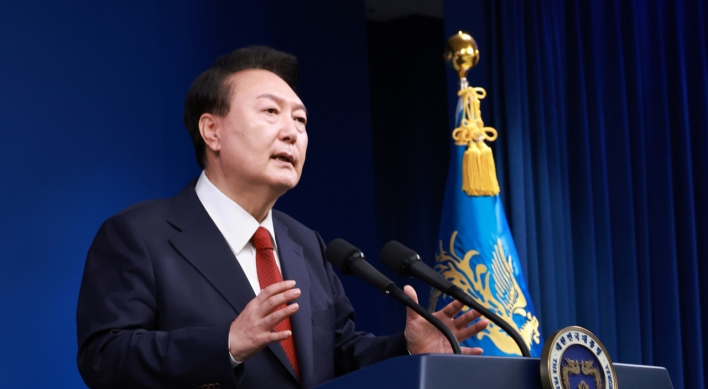[Weekender] Why Korean managers can’t turn a 'Blind' eye on employee feedback
By Moon Joon-hyunPublished : Sept. 16, 2023 - 16:00

This April, tragedy narrowly averted a GS Construction Consortium’s apartment construction site in Geomdan New Town, Incheon. The upper layers of an underground parking garage, designated as a children's playground, gave way, triggering a chain collapse.
While no casualties were reported as the accident happened late at night, the subsidence revealed a grim scenario had it occurred post-completion.
A month later, GS Engineering & Construction, the builder, admitted to omitting steel rebars in several sections of the building structure, drawing public mockery of the company's Xi apartment brand as "boneless."
The case took a shocking turn when it came to light that a warning about the incident had been shared on Blind, the anonymous workplace community app, the year before.
The post's author, who identified themself as a construction company employee, cautioned about compromising construction measures between 2020 and 2021.
“These buildings are compromised. Steer clear,” the post said.
A few months later, Lee Han-jun, CEO of the state-run Korea Land and Housing Corp., publicly apologized and vowed to rectify substandard construction practices.
The incident brought into view Blind’s burgeoning influence in Korea's corporate world, as it illustrated how a Blind post -- and an employee's warnings -- could have ramifications if not taken seriously.
From whispers to echos in Corporate Korea
“As we mark a decade, Blind has become a prominent feature of corporate Korea, despite its name suggesting otherwise. In the early days, some companies dismissed the platform as trivial complaints from a minority of employees. But with 86 percent of top-tier firm employees on Blind in 2023, the tide has turned,” said an official from TeamBlind, the company that runs the app.
Corporate executives, especially from conglomerates, seek out and track their performance on the Blind Index — a metric crafted in collaboration with the Korea Labor Institute to assess employee contentment.
Its influence has redefined corporate dialogues. Upper management are more willing to respond to platform-raised concerns.
“When superiors vaguely reference employee complaints they've heard, it's likely from a trending Blind post,” said an engineer from a major Korean battery manufacturer who asked to remain anonymous.
Blind serves as a candid outlet in corporate Korea, addressing subjects usually sidestepped in traditional Korean office discussions. Even for the nation’s most coveted workplaces like Samsung, the app has become a barometer for employee sentiment.
"We planned a company-wide dinner for the first time post-pandemic, but had to revise it after looking at feedback on Blind. Despite management's best intentions, overwhelming negative feedback demands some degree of response," said an executive from a Samsung company who preferred not to be named.
Korea Labor Institute's Lee Jung-hee, who recently conducted a study on Blind's influence on the shifting landscape of Korean corporate culture, pinpointed its soaring influence to providing employees a discrete and unattached feedback channel.
"In the traditional Korean corporate landscape, labor-management interactions often skew confrontational rather than collaborative. Representation for workers' rights necessitated association with specific groups. Blind has fostered an environment where employees can articulate concerns about specific issues, collectively, without any strings attached. It's a voice that management can no longer afford to sideline," said Lee.
A decade of media scandals and culture shifts
Blind's reputation has seen consistent growth over the last decade, particularly in the wake of major controversies, corruption scandals, and revelations that grabbed extensive media attention, both positive and critical.
The platform first made headlines in 2014 when employees from Korean Air Lines used it to expose an executive's unethical behavior, leading to the notorious “nut rage” scandal and subsequent legal action.
In 2018, Blind played a pivotal role in Korea's #MeToo movement. Accusations against high-profile figures like Kumho Asiana Group's Chairman Park Sam-koo, proliferated on the platform. Stories exposed alleged executive misconduct and company-wide gender biases. Blind created a dedicated board for discussions on sexual misconduct, amassing over 600 testimonies.
The app's user base swelled from 380,000 in early 2016 to 2 million by 2018's close. With the advent of the COVID-19 pandemic, Blind conversations pivoted to work policies in handling the outbreak, leading to another influx of users, hitting 4 million by September 2020.
A somber turn of events in 2021 involving the death of an employee of IT giant Naver, allegedly linked to workplace bullying, spurred intense discussions on Blind concerning workplace culture and toxicity. Accounts indicated that the individual endured continuous harassment from higher-ups.
By 2021, with its 6 million strong user base, Blind had entrenched itself as a corporate feedback channel. HR managers and even CEOs began embedding it within their operational flow.
“HR teams regularly monitor their company's Blind page to preemptively address issues before they gain wider attention, or sometimes even to resolve ongoing conflicts between departments,” said a manager from a leading Korean e-commerce company.
The 2021 publication, "Celltrionism," chronicling the rise of biopharmaceutical titan Celltrion, dropped an interesting nugget: CEO Seo Jung-jin's day commences with a Blind browsing session, keeping him aware of operational nitty-gritty to serious feedback on organizational challenges.
Thriving on community, not controversy
Historically, Blind has emphasized its community features for professionals, with revenue generation centered around in-app advertising and select community feature payments. But the company diversified by launching the dating app Bleet in 2020 and the recruitment-centric Blind Hire in 2021.
Internationally, Blind has made significant inroads in the US since 2015 in California and Seattle, boasting adoption by over 80 percent of major Silicon Valley professionals.
This success prompted comparisons with Glassdoor, an American company review mainstay. Glassdoor debuted an anonymous community feature this July, bearing resemblances to Blind's model — a move TechCrunch labeled as unmistakably Blind-inspired.
Like most online communities, Blind isn't devoid of challenges. Many posts lack constructive feedback, teeming with inconsequential complaints. The platform's strict user anonymity also means that false claims can easily slip through, as thorough verification is impossible after initial workplace verification.
The Labor Institute’s Lee asserts that Blind's contributions overshadow its limitations, especially considering the historically muted voices within Korea's workforce.
“The next challenge is deciding whether platforms like Blind remain insulated, stirring controversies anonymously, or evolve into a transparent medium for future corporate dialogue,” she said.









![[KH Explains] Can tech firms' AI alliances take on Nvidia?](http://res.heraldm.com/phpwas/restmb_idxmake.php?idx=644&simg=/content/image/2024/05/07/20240507050619_0.jpg&u=)








![[K-pop’s dilemma] Time, profit pressures work against originality](http://res.heraldm.com/phpwas/restmb_idxmake.php?idx=652&simg=/content/image/2024/05/08/20240508050705_0.jpg&u=20240508171126)
![[Today’s K-pop] NCT Dream to drop pre-release from 2nd Japan single](http://res.heraldm.com/phpwas/restmb_idxmake.php?idx=642&simg=/content/image/2024/05/08/20240508050725_0.jpg&u=)